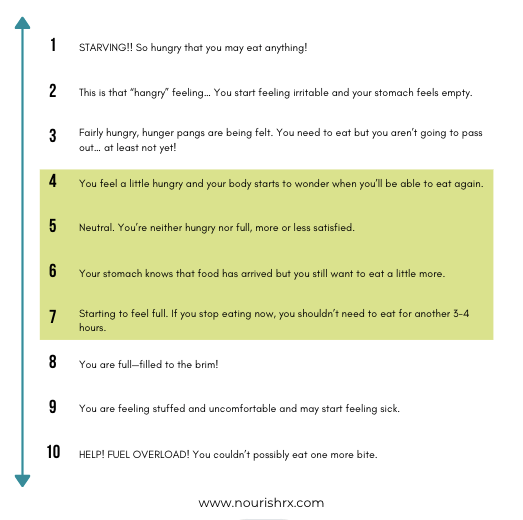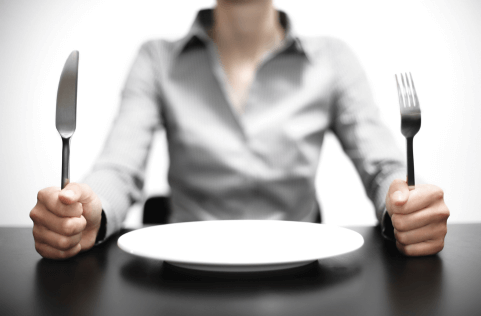We often talk here about how healing your relationship with food involves tuning in to your body cues and learning to respond in a supportive way. But what do you do if you don't feel hungry?
Eating when you are hungry sounds like a simple objective on the surface. But for many people, hunger is not always straightforward. And those with busy schedules may be all too familiar with the struggle of balancing hunger cues with available time in the day to set aside for eating.
So what do you do if you don’t feel hungry, but you want to do your best to support your body’s needs? Read on to learn more about what we recommend.
how do I know if I'm hungry?
With clients, we often turn to a tool called the Hunger and Fullness scale to get to know hunger cues and how they correspond to the intensity of your body’s need for fuel. The hunger scale shows us that hunger and fullness are not black and white – there are varying degrees of hunger, starting with something as subtle as increased thoughts about food.

As your body becomes more hungry, the cues become more obvious. You might experience a sense of emptiness in your stomach, or you might hear your stomach growl.
If you aren’t able to respond to hunger at this point, you may notice that your mental clarity starts to decrease and you lose your ability to focus. Eventually you might notice that your ability to stay calm and patient decreases and you start experiencing “hanger” (hungry anger).
At the very extreme end of the hunger scale, you may experience lightheadedness, wooziness, and perhaps an intense, primal urge to eat whatever is closest to you.
The hunger scale works best as a tool for a well-nourished body that has been fed consistently for a long period of time. If eating patterns are inconsistent, eating disorder behaviors are present, or intake has been severely reduced for a prolonged period of time, hunger may not follow such a linear trajectory.
If you have a difficult time recognizing the physical signs of hunger, try to identify any of the mental or emotional ones. Certainly, fatigue and lack of energy are both big cues that your body is asking for some fuel, and we don’t mean caffeine (but we’ll get to that more, below).
If you don't feel hungry that does not always mean your body doesn’t need fuel
The body aims to conserve energy when it isn’t getting enough energy from food, and won’t produce hunger signals as readily as it would if it were well-nourished. This is why hunger cues are often hard to identify early in eating disorder recovery or after years of chronic dieting.
Hunger signals are also susceptible to the impact of stress and anxiety. Some individuals may notice that during times of heightened stress, their desire to eat disappears. This is our body’s way of helping us outrun impending danger – think of our early ancestors escaping a predator. Unfortunately, this response isn’t helpful when the “danger” stressing us out is something we can’t simply run away from. We strongly encourage you to work with someone to develop strategies for managing chronic stress and anxiety, especially if you find they are interfering with your ability to take care of your basic needs, like nourishing your body with food.
If your hunger cues are disrupted, you may be tempted to think the if you don't feel hungry that means your body doesn’t need fuel. Until you are confident that you have been consistently nourishing your body with adequate nutrition over a long period of time (like with a prescriptive meal plan in eating disorder recovery), a lack of hunger cues is not a reliable reason to avoid eating or to eat less.

what to do if you don't feel hungry
If you don’t feel hungry but you know that your body needs nourishment, here are a few things you can try to eat that may be easier to stomach.
start with food before caffeine in the morning
Caffeine may provide a sense of energy, but did you know that energy from caffeine is totally different from the energy we get from food? Caffeine is a molecule that the brain interprets as a stimulant. It raises our heart rate, increases blood pressure, and makes it feel like we have energy. But all the cells in our body need nutrients from food, not caffeine, to keep all systems running.
A common side effect of caffeine is appetite suppression. Drinking coffee or tea first thing in the morning may be a popular habit, but it might also be keeping you from nourishing your body and dampening hunger cues throughout the rest of the day. What’s more, increased caffeine intake without adequate nourishment may increase anxiety symptoms for some.
The body functions best when you provide it nourishment and fuel at consistent intervals throughout the day. Your first meal tells your body that it can start doing the work it needs to do. Missing it may create a sense of scarcity for your body and mind, as your body tries to do its thing without adequate fuel coming in. Don’t worry – we won’t tell you to ditch your morning coffee.
But try eating before drinking your caffeinated beverage for an easier time eating your first meal of the day.
keep it simple
When you don't feel hungry, there’s no need to spend hours in the kitchen putting together a complicated meal or snack. Remove unnecessary barriers between you and your nourishment. All food has value and that includes simple, easily accessible options.
Simply pairing a shelf-stable source of carbohydrates (like sandwich bread, pita, crackers or pretzels) with something that has fat and protein (like cheese and turkey slices, nut or seed butter, or greek yogurt) can be all you need for a balanced, nourishing snack.
There is a place for convenience options when it means the difference between you missing a meal or getting in the energy your body needs. Frozen burritos, burger patties, meatballs, and even chicken tenders can be reliable options for easily getting some protein on your plate. Pair with grains like rice, pasta, or bread for balanced energy, and try to incorporate a fruit or vegetable if you can (but remember tomato sauce counts too).
try your favorites
Remember, all food has a place in your overall diet. The foods you love the most can be especially helpful when you don't feel hungry but need to eat.
Love french fries? Perfect. Let’s heat some up in the oven. Big fan of Mexican food? Awesome – order some tacos from your favorite restaurant for lunch. Make a “snack plate” full of your favorite foods like cheese, crackers, chocolate covered almonds, pretzels, deli turkey or charcuterie slices, hard boiled eggs, etc. Make it your own!
Really, anything goes. When you aren’t hungry but you know you need something to eat, it doesn’t have to be perfect. Your favorite foods are a great place to start. Even when you do start to experience hunger, we’d love for you to continue incorporating your favorite foods as often as you’d like.
go for something nostalgic
Comfort eating is both totally natural and can be an important tool for healing! Foods that evoke positive and comforting memories may be easier to eat than something new and unfamiliar. Look for foods at the grocery store that you enjoyed as a kid when you don't feel hungry. If you’re up for it, try making a family recipe or see if you can even convince a family member to whip up one of their famous dishes for you.
try something cold and soft
Foods that are cold and soft won’t require a lot of extra chewing, which can add to the difficulty of eating when you don’t have an appetite. As a bonus, cold and soft foods also have a refreshing element that can create a positive eating experience. Think of yogurt, smoothies, applesauce, pudding, or ice cream.
opt for a liquid option
When the act of eating feels overwhelmingly difficult, you don't feel hungry or you simply don’t have time to sit down and eat, liquid meals and snacks can come to the rescue. Liquids can be taken and easily consumed on-the-go, and it may be easier to finish a beverage than a full plate of food.
Smoothies, protein beverages, milk products, drinkable yogurt, and meal replacement beverages like Ensure or Boost can be great to have on hand when your appetite is low, or when food is unappealing.
Feel wary about consuming caloric beverages? Challenge this food rule with us. Calories come from nutrients that your body needs. Caloric beverages can be nourishing beverages, and sometimes they are exactly what is going to be most helpful for your body.

how nourishrx can support you when you don't feel hungry
There are a multitude of reasons why hunger is not always straightforward, and why it may be difficult to eat enough to support the needs of your body. Your body never stops needing food, even when hunger cues are quiet or your appetite is low. You can learn how to meet your body’s need for nourishment while acknowledging that eating is difficult by using some of these strategies, or by getting individual support for your unique situation.
At NourishRX, our dietitians are specialized in eating disorder recovery, intuitive eating, and a weight-neutral approach to health.
Above all, know that often this stage in the process of recovery and healing is temporary. It is our goal to help you reconnect with hunger and learn strategies to make eating enjoyable and satisfying for the rest of your life. Drop us a line to learn more about how we can best support you today!
Comments Off on What Do I Eat If I Don’t Feel Hungry?